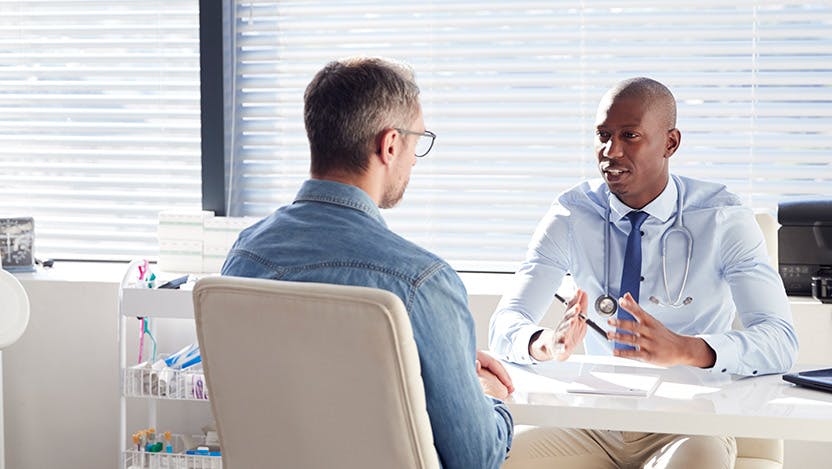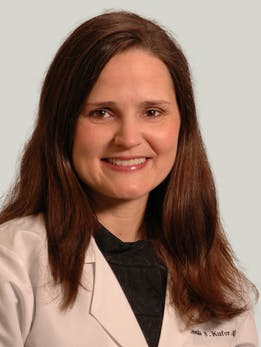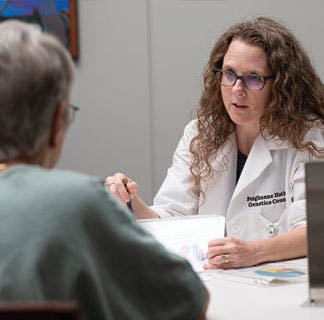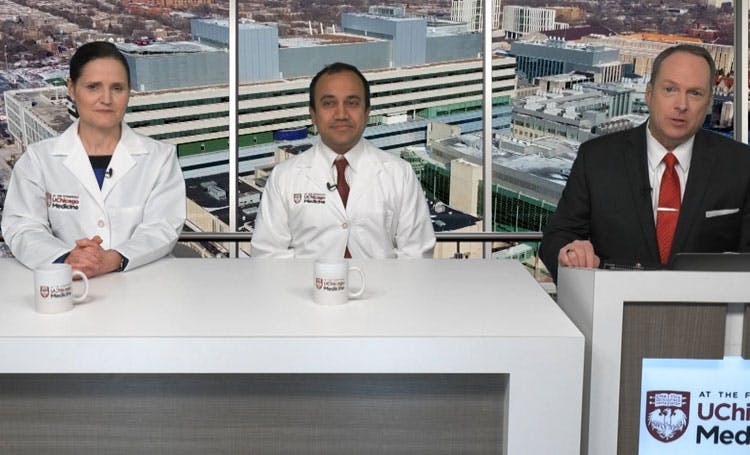Why are more people under 50 getting colorectal cancer?

A growing number of people under age 50 are being diagnosed with — and dying from — colorectal cancer, a trend University of Chicago Medicine gastroenterologist Sonia Kupfer, MD, calls “worrisome.”
While colorectal cancer rates have decreased for people over 50 years old, they have climbed 51% since 1994 for those under 50, according to the American Cancer Society. Death rates in this younger group are also rising.
“What’s alarming about this upward trend is that we don’t know what’s causing it,” said Kupfer, director of UChicago Medicine’s Gastrointestinal Cancer Risk and Prevention Clinic. “Right now, we think environmental influences are underlying the rise in incidence.”
Kupfer notes that this trend parallels the rise in obesity in America, but says things such as poor diet or a sedentary lifestyle aren’t solely to blame. That’s what puzzles Kupfer and her colleagues: They’re seeing more colorectal cancer patients who skew younger and are generally healthy. They don’t have the typical risk factors such as being over 50, having a family history, or a genetic syndrome. And they’re not obese, sedentary, heavy drinkers, smokers or poor eaters (consuming excessive processed food and red meat).
“Clearly, these risk factors do not completely explain this worrisome trend,” she said.
Myth vs. Fact: Colon Cancer
Busting myths about colorectal or colon cancer, the third most common cancer diagnosed in men and women in the United States.
Myth. A colonoscopy is the only way to screen for COVID cancer.
[RIPS]
Fact. Other tests, such as an at-home stool test or a virtual colonoscopy can be used to screen for colon cancer. Talk to your doctor about which option is right for you.
[SWOOPS]
Myth. It's OK to put off getting a colonoscopy because I don't have symptoms.
[RIPS]
Fact. Delaying a colonoscopy could put you at serious risk for more advanced cancer.
[SWOOPS]
Myth. No one in my family has had colorectal cancer, so I'm not at risk.
[RIPS]
Fact. Most colon cancers are found in people without a family history. A family history puts you at higher risk.
[SWOOPS]
Learn more at UChicagoMedicine.org/cancer.
[MUSIC PLAYING]
In response to the growing number of cases among younger adults, national guidelines now recommend that colorectal cancer screenings begin at age 45. People should talk to their doctors about screening options, including stool tests or a colonoscopy.
Turning this trend around is a challenge for two main reasons:
1. Colon and rectal cancers often have no symptoms. As a result, people often don’t realize something’s wrong. When there are symptoms — blood in the stool, constant constipation, pencil-shaped stools, weight loss or not feeling well — it’s often attributed to other things, such as hemorrhoids or a change in diet. More preventative screening is needed to prevent and detect cancer.
2. People don’t get colonoscopies. A colonoscopy is the best and most accurate way to check for and remove precancerous polyps, but it requires people to do a colon cleansing the night before the procedure. Several other stool-based tests are available that are good for detecting cancer early, but a colonoscopy is the most accurate way to check for precancerous polyps as well as identify cancer early. Plus, if the other tests show any positive results, the next step is a colonoscopy. A colonoscopy is the only all-in-one test, Kupfer said.
The good news is, scientists are working on ways to make colorectal cancer screenings easier, including a blood-based test that’s on the horizon, Kupfer said.
Researchers are also working to boost the quality of colonoscopies. UChicago Medicine is part of a study involving artificial intelligence (AI) to improve colonoscopies using algorithms to detect polyps and increase visual detection. As part of the modern era of personalized medicine, oncologists are also working to find out why certain colorectal cancerous tumors react differently than others to treatments. Kupfer has a laboratory that’s trying to understand how different tissues respond to environmental factors, how they impact the colon and if they could benefit from things like vitamin D or aspirin.
In the meantime, early screening for colorectal cancer remains critical. Detecting the cancer early is the best way to improve the odds of it becoming deadly.
“It’s not impossible for people in their 30s to get colon cancer,” Kupfer said. “The best advice we can give is to not ignore any type of symptom. Let your doctor know if you have blood in your stool. Don’t just say, ‘Oh, it’s probably just a hemorrhoid.’”

Sonia Kupfer, MD
Sonia Kupfer, MD, is a gastroenterologist and an expert in diagnosing and treating genetic disorders including hereditary gastrointestinal cancer syndromes and celiac disease. She serves as director of the Gastrointestinal Cancer Risk and Prevention Clinic and co-director of the Comprehensive Cancer Risk and Prevention Clinic.
See Dr. Kupfer's profile
Cancer Risk and Prevention
The UChicago Medicine Comprehensive Cancer Risk and Prevention Clinic is dedicated to identifying and caring for individuals who have an increased risk for cancer due to family history, medical and genetic factors, and/or lifestyle influences.
Learn about cancer risk and prevention servicesAt the Forefront Live: Colorectal Cancer Awareness

